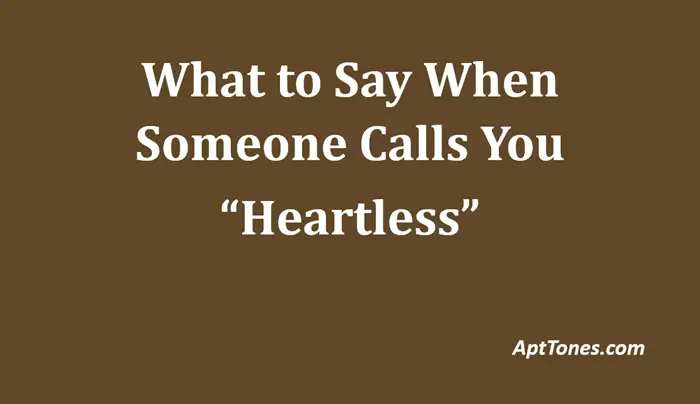Has anyone ever branded you as “heartless”? This accusation, often hurled in moments of high emotion or misunderstanding, can sting deeply. It challenges not just our actions but questions our very character and capacity for empathy.
Whether it comes from a place of hurt, frustration, or genuine misunderstanding, responding to such a label requires a blend of tact, sincerity, and, at times, introspection.
What to Say When Someone Calls You Heartless
Here are 20 thoughtful and respectful ways to reply when someone calls you heartless, each crafted to address the underlying issues, clarify intentions, and mend fences where possible.

“I’m sorry you feel that way. Can we talk about what led you to this conclusion?”
This response opens the door for dialogue, showing you’re willing to listen and understand the other person’s perspective. It’s appropriate when you genuinely don’t understand why you’ve been called heartless and want to address the root of the problem.
“I might seem unemotional, but I do care deeply. Perhaps I’m not showing it well enough.”
Ideal for instances where your actions or demeanor might have been misinterpreted, this response acknowledges the possibility of a disconnect between your internal feelings and external expressions.
“That’s a strong word. I’m curious to know why you think so.”
This reply invites the other person to share their reasoning, indicating your openness to constructive criticism. It’s best used in situations where you’re prepared to engage in a calm and rational discussion about your actions or decisions.
“I understand that my decision might seem harsh, but there are reasons behind it. Can I explain?”
Use this when you’ve made a tough decision that others might not immediately understand. It shows that you’re not indifferent but rather acting based on considerations that might not be apparent to others.
“I’m sorry for giving that impression. Let’s find a way to solve this together.”
A good choice when you want to quickly move past the accusation and work towards a resolution, showing your willingness to collaborate and find a middle ground.
“I’ve been called heartless before, and it’s something I’m working on. Thank you for your honesty.”
This response is reflective and shows personal growth. It’s suitable when you’re aware of how your actions might be perceived and are actively trying to change.
“Is there a specific action of mine that made you feel this way?”
Asking for specifics can help you understand the exact cause of their perception and address it directly. It’s helpful when you’re genuinely puzzled by the accusation.
“I respect your perspective, but I believe there’s a misunderstanding here. May I share my side?”
This shows respect for the other person’s feelings while also asserting that the situation might not be as black and white as it seems. It’s useful for clarifying misunderstandings.
“It wasn’t my intention to seem uncaring. Let’s work on communicating better.”
Acknowledging the communication gap and suggesting a path forward can be effective in rebuilding understanding and empathy between both parties.
“I’m often more practical than emotional, which might come off as heartless. I assure you, that’s not the case.”
A response for those who naturally prioritize logic over emotion, explaining your approach without dismissing their feelings.
“Maybe I need to rethink how I handle situations like this. I’m open to suggestions.”
Demonstrating a willingness to change and seek advice is powerful, especially if you’re in a leadership position or a role where your decisions impact others.
“It’s hard to hear that, but I’m glad you’re telling me. Let’s figure out where things went wrong.”
Showing gratitude for the feedback despite its harshness indicates maturity and a commitment to improving your relationship.
“This seems to be about more than just one incident. Can we discuss what’s really bothering you?”
When you suspect that the “heartless” comment is a symptom of a deeper issue, this response encourages a more comprehensive discussion.
“I believe in tough love, but it’s never my intention to hurt anyone. How can we address this moving forward?”
For those whose “heartless” actions stem from a place of wanting to help or motivate, this reply clarifies your intentions and seeks a path to mutual understanding.
“Hearing that makes me realize I have some self-reflection to do. Can we talk more about this?”
An introspective response that acknowledges the impact of their words and shows your willingness to consider their point of view seriously.
“I value your input and didn’t mean to come across as indifferent. How can I make this right?”
Expressing value for the other person’s feelings and seeking a way to amend the situation demonstrates a sincere desire to correct any perceived wrongs.
“Let’s take a step back and see how we got here. I’m sure there’s a way to understand each other better.”
Encouraging both parties to review the sequence of events that led to the accusation can help identify misunderstandings or overlooked details.
“I’m more reserved with my emotions, which might be why you feel this way. Let’s try to bridge that gap.”
For individuals who naturally guard their emotions, this response offers an explanation and a willingness to open up more.
“Your words have given me a lot to think about. I hope we can continue this conversation later.”
When you need time to process the accusation and its implications, this reply allows you to pause the conversation respectfully while signaling your intention to revisit it.
“I want to understand your point of view better. Could you help me see where I went wrong?”
Asking for guidance shows humility and a genuine interest in mending the rift, making it a strong choice for moving towards reconciliation.
Wrap-up
Responding to being called heartless isn’t about defending your ego but understanding the other person’s feelings and working together towards a better understanding. Each of these responses offers a pathway to address concerns, clarify intentions, and strengthen relationships, demonstrating that even in the face of harsh criticism, compassionate communication can lead to positive outcomes.